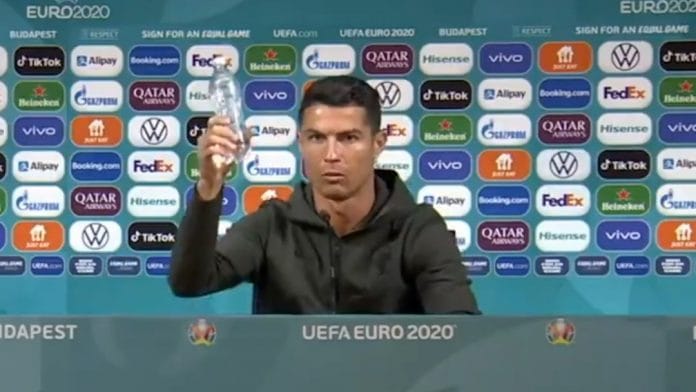It’s not the first time a celebrity’s denouncement of a branded product has sent its shares tumbling, but the sheer drama with which footballer Cristiano Ronaldo shoved two bottles of Coca-Cola out of the camera at a European Championship press conference made it a historic, meme-worthy moment.
The market response was quick. Coca-Cola’s market value plunged by $4 billion. What makes the entire episode so fulfilling is that Ronaldo didn’t give a damn that Coca-Cola is one of the top 12 sponsors of Euro 2020. Maybe he had had some Thums Up before coming to the conference — who knows! In the meantime, Pepsi, it seems, remains the go-to drink of our cricket team.
Although Cristiano Ronaldo’s act is getting all kinds of attention, he isn’t the first celebrity to remind the world just how bad Coca Cola —or any other carbonated soft drink — is for people’s health. We all know how much caffeine and sugar they contain, are extremely water intensive, and are possibly the easiest way to put on weight in an unhealthy manner.
Bollywood veteran Amitabh Bachchan confessed at an event in 2014 that a little girl made him give up endorsing Pepsi and he became conscious about promoting such products. Ramdev ran an entire campaign denouncing the drinks as toilet cleaners. These two have been the OG anti-coke influencers in India.
For many adults, the entire functionality of Coke/Pepsi/Thums Up is to mix it with their Old Monk and have it with Blue Lay’s. Maybe Ronaldo would understand if he ever gets his hand on an Old Monk bottle.
For now though, what Ronaldo has unwittingly done is possibly heralded an era when people would start de-endorsing soft drinks in the same way that they once denounced tobacco, as lobbies weaken in front of the evident ill-effects to one’s health.
Just see how quickly it sparked off similar reactions: within a day, France midfielder Paul Pogba removed a beer bottle of Heineken placed in front of him, while Italy midfielder Manuel Locatelli also put aside Coca-Cola bottles at a press conference, inviting warnings from the Union of European Football Associations (UEFA).
Also read: Bollywood star on ads, Disneyland tickets, space-age branding & yet Thril cola fizzled out
Important for sportspersons to denounce Pepsi
Walk the talk, practice what you preach, etc. etc. must apply to brand ambassadors.
While Cristiano Ronaldo snubbed coke for water in Budapest, earlier he was busy endorsing the brand. Safe to assume, he wasn’t drinking it back then either.
Same goes for India cricket captain Virat Kohli, who decided against endorsing fairness creams and Pepsi.
These decisions by sports stars arrive late, but better late than never.
Much like the UEFA, you will also see these brands sponsor sports in India, and associate themselves with actors. Let’s talk about cricket in silos here. Pepsi sponsored the Indian Premier League (IPL) from 2013 to 2015, and has historically employed India’s cricket stars as its brand ambassadors. Their sponsorship ended prematurely after corruption scandals in the IPL came to light. Coca-Cola will remain the International Cricket Council (ICC)’s main beverage partner until 2023.
This subconsciously allows us to associate the drinks to athletes — one of the fittest people on the planet. It’s not difficult for them to wonder, ‘If Virat Kohli drinks Pepsi or Ronaldo drinks coke and even endorses it, then what’s the harm in it?’
But when those same celebrities disown a brand and take up responsibility, it makes people sit up and take note. Such de-endorsements are important.
Also read: Kids on Youtube see many ads, at times violent clips, but few educational videos, study says
How are soft drinks ads still acceptable?
Fictional character Don Draper from Mad Men who dominated Madison Avenue street and the ad world in the 1960s, wrote a full-length ad on Lucky Strikes, a cigarette company that comprised 35 per cent of his agency’s revenue but was pulling out of business with them, ending a long partnership.
His ad in The New York Times was titled ‘Why I’m Quitting Smoking’, where Draper succinctly pens down how and why advertisers have been selling us poisonous products, “For over 25 years we devoted ourselves to peddling a product for which good work is irrelevant, because people can’t stop themselves from buying it. A product that never improves, that causes illness, and makes people unhappy. But there was money in it. A lot of money. In fact, our entire business depended on it. We knew it wasn’t good for us, but we couldn’t stop,” Draper wrote.
Mad Men was set in a time when restrictions on selling tobacco products were just taking off. We have known, for a while now, that soft drinks are just as harmful to us and damage our bodies in ways we don’t fully understand.
Yet, we tolerate them. In 2016, non-alcoholic beverage market in India was Rs 37,660 crore with carbonated and aerated drinks accounting for 40 per cent of it.
Since the production of aerated drinks drains the water resources at places they are manufactured, companies aggressively direct their CSR (corporate social responsibility) towards water conservation projects and return every drop of water they use. Though it’s doubtful it ever happens.
There was a time when Bollywood stars Akshay Kumar and Jackie Shroff were selling cigarettes. Today, Salman Khan, Hrithik Roshan, Ranbir Kapoor, cricketer Shafali Verma and the like are selling soft drinks.
In the near future, perhaps Ajay Devgn or Shah Rukh Khan won’t be able to do a ‘Zubaan kesari‘ and sell us Vimal Elaichi, and Hrithik Roshan won’t be able to get away by saying ‘Darr ke aage jeet hai’ to sell us Mountain Dew. Because it’s more than clear that Mountain Dew ke aage sirf diabetes or obesity hai.
Views are personal.
(Edited by Prashant Dixit)






